Data architecture—the process of documenting an organization’s data assets—is a hot skill right now, and according to the US Bureau of Labor Statistics, the number of roles for data architects is going to continue to grow over the next decade. Taking a course to learn these job-ready skills can help you expand your resume, grow into a new role at your company, or even kickstart a new career.
However, if you’re going to spend the time and money to acquire these essential skills, you’ll want the best quality education you can get, and that requires a lot of research. This guide will show you the most popular and best-value courses on the market right now so you can choose your school and start learning as soon as possible.
Is a Data Architecture Course Worth It?
Definitely. Online data architecture courses can guide you through expert-written curriculums that cover all the technical and soft skills you need to enter the industry. Along with giving you a strong portfolio and practical experience, these courses are definitely worth it and can help you land your first entry-level architect role.
8 Best Data Architecture Courses
| Company | Course | Rank | Price | Details |
|---|---|---|---|---|
 | Data Science Career Track | 4.64 | $9,900 | Learn More |
 | Data Architect Nanodegree Program | 4.72 | $1,356 | Learn More |
 | Data Architecture Course | 4.7 | N/A | Learn More |
 | Crash Course in Data Architecture | N/A | N/A | Learn More |
 | Data Architect Learning Path | N/A | N/A | Learn More |
 | Big Data Architect Certification eLearning Study Kit Bundle | N/A | $396 | Learn More |
 | Ultimate AWS Certified Solutions Architect Associate SAA-C03 | 2.4 | $84.99 | Learn More |
 | Building a Modern Data Architecture for the Data Driven Enterprise | 3 | $45 | Learn More |
Here are our top favorite data architecture courses, all with proven ability to create employable graduates.
Data Science Career Track – Springboard

Rating
Course Report: 4.64 out of 5 (1,304 ratings)
Overview
The Data Science Career Track from Springboard will teach you a variety of in-demand skills that can open up multiple new career directions for you in the tech industry. With this course, you’ll cover the following subjects and more:
- Data wrangling
- Statistical inference
- Machine learning
- Software engineering
- Advanced machine learning
Get To Know Other Data Science Students
Meghan Thomason
Data Scientist at Spin
Aaron Pujanandez
Dir. Of Data Science And Analytics at Deep Labs
Pizon Shetu
Data Scientist at Whiterock AI
Best For
With expert tutors and 1:1 calls with career experts and mentors, this comprehensive course is perfect if you want to enter a new career as a data scientist. To apply, you need to either have around six months of coding experience or take Springboard’s Foundations to Core prep course before enrolling.
Duration
There are over 500 hours of content in this career track, and it takes around six months to complete when studying 20-25 hours per week.
Price
The total price of the course is $9,900, but there are many flexible financing options available.
Become a Data Architect Nanodegree – Udacity
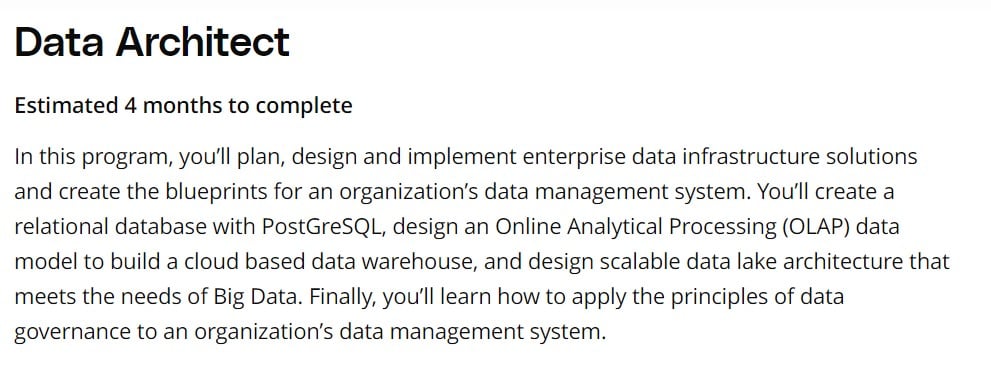
Rating
Course Report: 4.72 out of 5 (611 ratings)
Overview
This course focuses specifically on data architecture rather than the broader subject of data science and covers some of the following topics:
- How to design data systems for business requirements
- Big data systems
- Data governance
Learn with recorded video lectures and receive as much personal feedback for assignments as you need to progress smoothly.
Best For
Udacity requires students to have intermediate Python and SQL engineering skills to enroll in this course, as it teaches a specific branch of data science.
Duration
All Udacity courses are designed to be completed in four months, but you can progress at a slower pace if you choose.
Price
Four months of access to the course materials cost $1,356.
Architecting Data: Data Architecture – Skillsoft
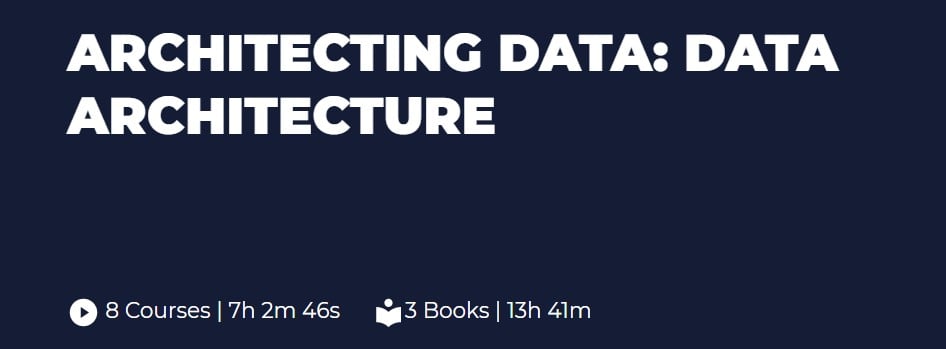
Rating
FeaturedCustomers: 4.7 out of 5 (2,736 ratings)
Overview
Skillsoft courses put together a range of resources to help self-studiers learn the technical skills they want. With this data architecture offering, you get access to eight video courses and three books that cover topics such as:
- Amazon Redshift
- Quicksight
- Data management
- Adoption frameworks
- Microservices
- Serverless computing
Best For
These resources are great for students who like to study alone or if you want to add some structure to the studying you do outside of class.
Duration
There are eight courses totaling seven hours and three books totaling 13 hours.
Price
Courses are available through a monthly subscription to the Skillsoft website.
Crash Course in Data Architecture – Dataiku on YouTube

Rating
Not applicable.
Overview
This video will help newcomers to the world of data architecture understand the main concepts of the role and the goals of well-designed and implemented data architecture. It covers the basics of data architecture, cybersecurity, scaling, structure, ROIs, and common challenges.
Best For
This crash course is perfect if you’re just beginning your research into the role of data architects and what they do. If you’re not ready to sign up for a bootcamp yet, try watching this video to get a better feel for the job and the foundational database skills you need.
Duration
The video is approximately 45 minutes long.
Price
This is a free crash course available on YouTube.
Free Data Architect Learning Path – DataKwery

Rating
Not applicable.
Overview
DataKwery has put together a free learning path for data architecture, containing a collection of courses from reputable sites like Microsoft, Udacity, Coursera, and edX. You can take all or a mixture of these courses, which cover topics such as:
- Microsoft Azure
- Python programming language
- Relational databases
- SQL data analysis
- Spark
- Wrangling massive amounts of data
- Linux Command Line
- Git version control
- Enterprise data architecture
- Cloud computing
Best For
You can use these courses to supplement your current studies or use them to help you get a feel for the subject matter before starting a longer course.
Duration
There are multiple courses to choose from, ranging from two hours in length to 16 weeks.
Price
These courses are free to the public.
Big Data Architect Certification eLearning Study Kit Bundle – Arcitura
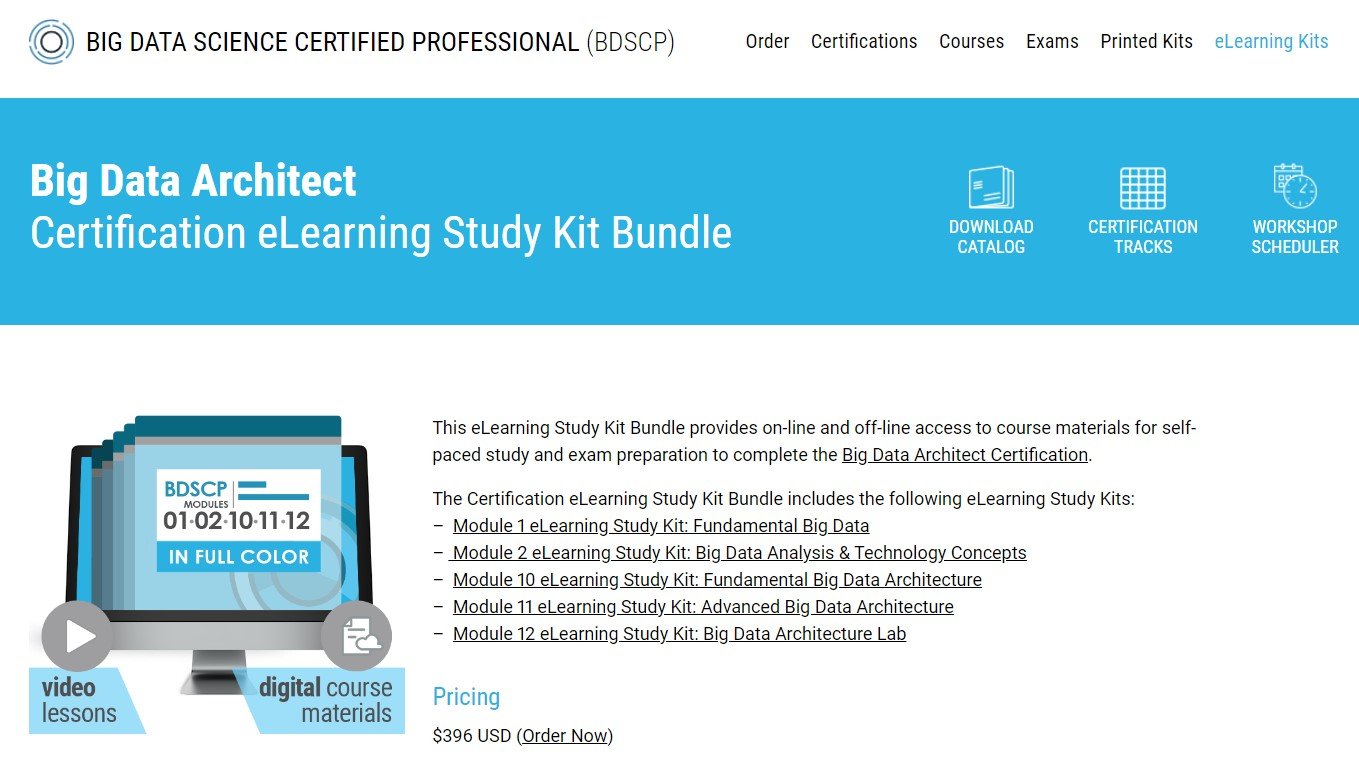
Rating
Not applicable.
Overview
With the Big Data Architect Study Kit Bundle, you’ll have everything you need to study for and pass your certification exams for the Big Data Architect Certification. The bundle includes five modules that cover a range of topics using a mixture of video lessons and digital course materials.
Best For
These materials have been bundled together specifically to help students pass the Big Data Architect Certification, a well-known certification from Arcitura.
Duration
There are five modules of varying lengths included in the course.
Price
The course materials cost $396.
Ultimate AWS Certified Solutions Architect Associate SAA-C03 – Stephane Maarek on Udemy

Rating
Trustpilot: 2.4 out of 5 (964 ratings)
Overview
The bundle will help students learn cloud computing and take a practice exam in preparation for the AWS Certified Solutions Architect Associate Certification SAA-C03. This is a solid piece of software for qualified data architects to have hands-on experience with, and a certification that showcases your practical skills will look good on any data scientist’s resume.
Best For
The course recommends some basic IT knowledge to make the most of this course, plus a working machine running Windows, Linux, or Mac OS.
Duration
There are a total of 382 lectures included with the course that total almost 27 hours in length.
Price
The full price of the course when it’s not on sale is $84.99.
Building a Modern Data Architecture for the Data Driven Enterprise – Pluralsight

Rating
Course Report: 3 out of 5 (2 ratings)
Overview
This course includes a video from a talk at a Big Data LDN event and covers some useful topics such as:
- What is data architecture?
- Examples of data architecture
- The hybrid computing environment
- Types of database management
- Cloud-based data warehouses
- Data flow
Best For
This video can be accessed for free and gives an accessible and easy-to-understand introduction to the world of data architecture, what it is and what we use it for. If you’re new to this area of study, this is a great resource to help you get started.
Duration
This short-form course is just 30 minutes long.
Price
Pluralsight courses can be accessed through a $45 monthly subscription, but there is also a 10-day free trial available.
How Do You Choose a Data Architecture Course?
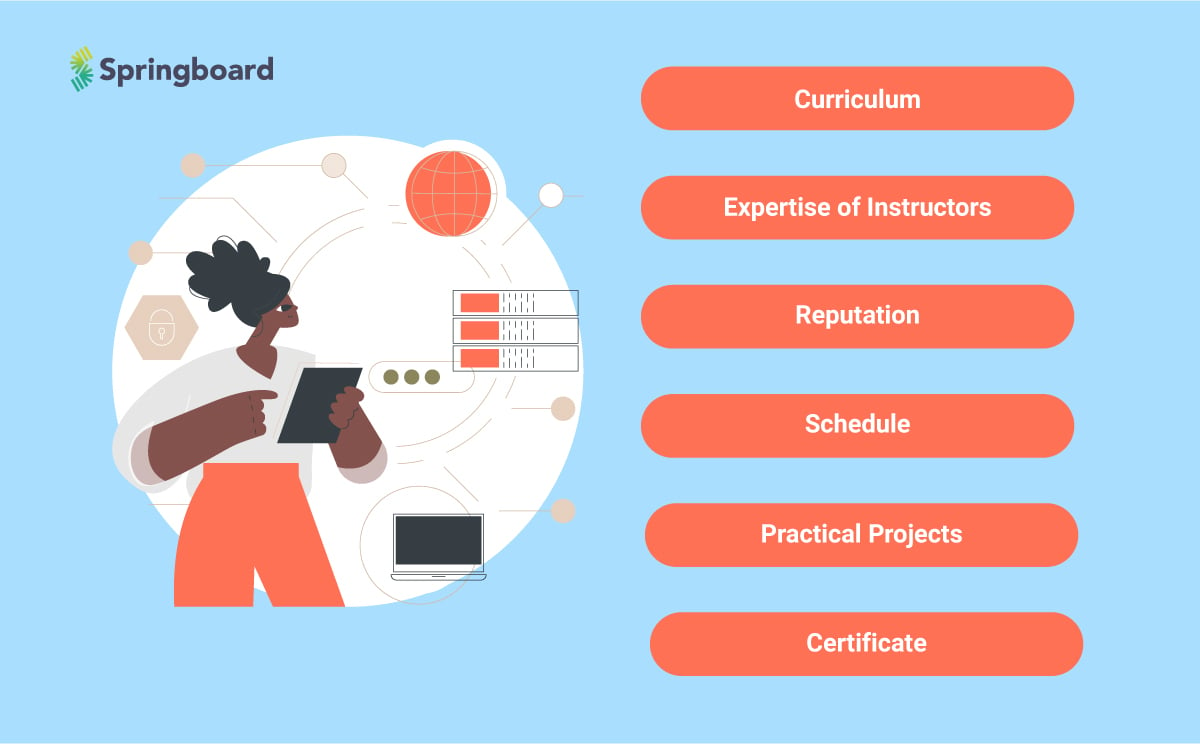
Take a look at our tips on choosing a data architecture course, so you know what to look out for.
Curriculum
Some curriculums start at the beginner level, and others jump in halfway for more intermediate students. Almost all course websites will have a detailed syllabus for you to download and read through, so make sure you do.
Expertise of Instructors
The best instructors have industry experience—both as instructors and as data architects. This way, they can help you through technical problems with professional teaching skills and give you valuable insight into the tech industry and the life of a cloud architect.
Reputation
You wouldn’t buy a new phone without reading reviews, so don’t sign up for a course without reading their reviews, either. It’s good to be sure that the course provider can deliver on their claims and produce satisfied customers.
Pricing
As well as the upfront price of the course, there will also be a variety of different payment methods for you to consider. The most important thing here is to read the terms and conditions and understand exactly what you’re agreeing to.
Schedule
If you have a job or other obligations, you need to take note of course schedules. While there are self-paced courses available, many opt for live sessions and lectures that will require you to attend at certain times of the day.
Practical Projects and Career Guidance
Career guidance is something you should definitely look out for because you’ll be able to get expert advice on your resume and interviewing skills. Another thing you need for your job hunt will be a portfolio—completing practical projects during the course can help you build one.
Certificate
A certificate can be a helpful tool to get your foot in the door during your job hunt, as it can help land you the all-important interview. The type of certificate a course offers doesn’t matter too much, but always make sure they provide one in some form. Additional certifications, such as the AWS SAA-C03, will also be great additions to your resume.
Making the Most Out of Your Data Architecture Course
Learning at a data science bootcamp isn’t quite the same as studying at school or college, so we recommend researching what you’ll be doing. Here are some questions to ask yourself:
How Will the Course Work?
Data architecture courses are completed completely through your laptop or computer because that’s how you’ll watch and join classes and how you’ll complete the assignments and projects. It’s best to have a webcam and a strong internet connection to help achieve a smooth experience.
What Should You Expect To Learn in a Data Architecture Course?
Here are some of the topics you can expect to cover in a data architecture course:
- Data wrangling
- Designing enterprise data infrastructure solutions
- Statistical inference
- Machine learning
- Relational databases
- Management systems
- Processing systems
- SQL queries
- Large-scale data processing systems
- Dimensional Data models
- Hybrid cloud environments
- SQL data analysis
- Organizational data strategy
- Predictive analytics
- Statistical Analysis
- Git version control
- Google Cloud platform
What Will Your Schedule Look Like?
If you choose a full-time course, you can expect a full day of lectures every weekday from around 9:30 am to 6:30 pm. With part-time courses, you’ll attend classes during weekday evenings and weekends, and self-paced courses tend to have no schedules at all. Keep in mind that these times and days change from course to course, so make sure you verify them before you enroll.
FAQs About Data Architecture Courses
To finish, here are some frequently asked questions we get about data architecture courses.
What Are the Prerequisites for a Data Architecture Course?
For courses that focus specifically on data architecture, there are often prerequisites, as many students will have already taken some data analysis courses or data science courses and know basic Python and SQL.
Does a Data Architect Need To Code?
Depending on the details of the job description, not all data architects need to code very often. However, a lot of courses will teach SQL and Python, as a good knowledge of these languages will help you stand out to employers.
What Skills Do You Need To Be a Data Architect?
There are a variety of technical and soft skills you need to be a data architect, as you’ll be working with servers, cloud computing, and databases regularly and collaborating with colleagues to design the right data system for your company. Coding skills in Python, SQL, statistical inference, machine learning, and data wrangling are commonly sought after.
Companies are no longer just collecting data. They’re seeking to use it to outpace competitors, especially with the rise of AI and advanced analytics techniques. Between organizations and these techniques are the data scientists – the experts who crunch numbers and translate them into actionable strategies. The future, it seems, belongs to those who can decipher the story hidden within the data, making the role of data scientists more important than ever.
In this article, we’ll look at 13 careers in data science, analyzing the roles and responsibilities and how to land that specific job in the best way. Whether you’re more drawn out to the creative side or interested in the strategy planning part of data architecture, there’s a niche for you.
Is Data Science A Good Career?
Yes. Besides being a field that comes with competitive salaries, the demand for data scientists continues to increase as they have an enormous impact on their organizations. It’s an interdisciplinary field that keeps the work varied and interesting.
10 Data Science Careers To Consider
Whether you want to change careers or land your first job in the field, here are 13 of the most lucrative data science careers to consider.
Data Scientist
Data scientists represent the foundation of the data science department. At the core of their role is the ability to analyze and interpret complex digital data, such as usage statistics, sales figures, logistics, or market research – all depending on the field they operate in.
They combine their computer science, statistics, and mathematics expertise to process and model data, then interpret the outcomes to create actionable plans for companies.
General Requirements
A data scientist’s career starts with a solid mathematical foundation, whether it’s interpreting the results of an A/B test or optimizing a marketing campaign. Data scientists should have programming expertise (primarily in Python and R) and strong data manipulation skills.
Although a university degree is not always required beyond their on-the-job experience, data scientists need a bunch of data science courses and certifications that demonstrate their expertise and willingness to learn.
Average Salary
The average salary of a data scientist in the US is $156,363 per year.
Data Analyst
A data analyst explores the nitty-gritty of data to uncover patterns, trends, and insights that are not always immediately apparent. They collect, process, and perform statistical analysis on large datasets and translate numbers and data to inform business decisions.
A typical day in their life can involve using tools like Excel or SQL and more advanced reporting tools like Power BI or Tableau to create dashboards and reports or visualize data for stakeholders. With that in mind, they have a unique skill set that allows them to act as a bridge between an organization’s technical and business sides.
General Requirements
To become a data analyst, you should have basic programming skills and proficiency in several data analysis tools. A lot of data analysts turn to specialized courses or data science bootcamps to acquire these skills.
For example, Coursera offers courses like Google’s Data Analytics Professional Certificate or IBM’s Data Analyst Professional Certificate, which are well-regarded in the industry. A bachelor’s degree in fields like computer science, statistics, or economics is standard, but many data analysts also come from diverse backgrounds like business, finance, or even social sciences.
Average Salary
The average base salary of a data analyst is $76,892 per year.
Business Analyst
Business analysts often have an essential role in an organization, driving change and improvement. That’s because their main role is to understand business challenges and needs and translate them into solutions through data analysis, process improvement, or resource allocation.
A typical day as a business analyst involves conducting market analysis, assessing business processes, or developing strategies to address areas of improvement. They use a variety of tools and methodologies, like SWOT analysis, to evaluate business models and their integration with technology.
General Requirements
Business analysts often have related degrees, such as BAs in Business Administration, Computer Science, or IT. Some roles might require or favor a master’s degree, especially in more complex industries or corporate environments.
Employers also value a business analyst’s knowledge of project management principles like Agile or Scrum and the ability to think critically and make well-informed decisions.
Average Salary
A business analyst can earn an average of $84,435 per year.
Database Administrator
The role of a database administrator is multifaceted. Their responsibilities include managing an organization’s database servers and application tools.
A DBA manages, backs up, and secures the data, making sure the database is available to all the necessary users and is performing correctly. They are also responsible for setting up user accounts and regulating access to the database. DBAs need to stay updated with the latest trends in database management and seek ways to improve database performance and capacity. As such, they collaborate closely with IT and database programmers.
General Requirements
Becoming a database administrator typically requires a solid educational foundation, such as a BA degree in data science-related fields. Nonetheless, it’s not all about the degree because real-world skills matter a lot. Aspiring database administrators should learn database languages, with SQL being the key player. They should also get their hands dirty with popular database systems like Oracle and Microsoft SQL Server.
Average Salary
Database administrators earn an average salary of $77,391 annually.
Data Engineer
Successful data engineers construct and maintain the infrastructure that allows the data to flow seamlessly. Besides understanding data ecosystems on the day-to-day, they build and oversee the pipelines that gather data from various sources so as to make data more accessible for those who need to analyze it (e.g., data analysts).
General Requirements
Data engineering is a role that demands not just technical expertise in tools like SQL, Python, and Hadoop but also a creative problem-solving approach to tackle the complex challenges of managing massive amounts of data efficiently.
Usually, employers look for credentials like university degrees or advanced data science courses and bootcamps.
Average Salary
Data engineers earn a whooping average salary of $125,180 per year.
Database Architect
A database architect’s main responsibility involves designing the entire blueprint of a data management system, much like an architect who sketches the plan for a building. They lay down the groundwork for an efficient and scalable data infrastructure.
Their day-to-day work is a fascinating mix of big-picture thinking and intricate detail management. They decide how to store, consume, integrate, and manage data by different business systems.
General Requirements
If you’re aiming to excel as a database architect but don’t necessarily want to pursue a degree, you could start honing your technical skills. Become proficient in database systems like MySQL or Oracle, and learn data modeling tools like ERwin. Don’t forget programming languages – SQL, Python, or Java.
If you want to take it one step further, pursue a credential like the Certified Data Management Professional (CDMP) or the Data Science Bootcamp by Springboard.
Average Salary
Data architecture is a very lucrative career. A database architect can earn an average of $165,383 per year.
Machine Learning Engineer
A machine learning engineer experiments with various machine learning models and algorithms, fine-tuning them for specific tasks like image recognition, natural language processing, or predictive analytics. Machine learning engineers also collaborate closely with data scientists and analysts to understand the requirements and limitations of data and translate these insights into solutions.
General Requirements
As a rule of thumb, machine learning engineers must be proficient in programming languages like Python or Java, and be familiar with machine learning frameworks like TensorFlow or PyTorch. To successfully pursue this career, you can either choose to undergo a degree or enroll in courses and follow a self-study approach.
Average Salary
Depending heavily on the company’s size, machine learning engineers can earn between $125K and $187K per year, one of the highest-paying AI careers.
Quantitative Analyst
Qualitative analysts are essential for financial institutions, where they apply mathematical and statistical methods to analyze financial markets and assess risks. They are the brains behind complex models that predict market trends, evaluate investment strategies, and assist in making informed financial decisions.
They often deal with derivatives pricing, algorithmic trading, and risk management strategies, requiring a deep understanding of both finance and mathematics.
General Requirements
This data science role demands strong analytical skills, proficiency in mathematics and statistics, and a good grasp of financial theory. It always helps if you come from a finance-related background.
Average Salary
A quantitative analyst earns an average of $173,307 per year.
Data Mining Specialist
A data mining specialist uses their statistics and machine learning expertise to reveal patterns and insights that can solve problems. They swift through huge amounts of data, applying algorithms and data mining techniques to identify correlations and anomalies. In addition to these, data mining specialists are also essential for organizations to predict future trends and behaviors.
General Requirements
If you want to land a career in data mining, you should possess a degree or have a solid background in computer science, statistics, or a related field.
Average Salary
Data mining specialists earn $109,023 per year.
Data Visualisation Engineer
Data visualisation engineers specialize in transforming data into visually appealing graphical representations, much like a data storyteller. A big part of their day involves working with data analysts and business teams to understand the data’s context.
General Requirements
Data visualization engineers need a strong foundation in data analysis and be proficient in programming languages often used in data visualization, such as JavaScript, Python, or R. A valuable addition to their already-existing experience is a bit of expertise in design principles to allow them to create visualizations.
Average Salary
The average annual pay of a data visualization engineer is $103,031.
Resources To Find Data Science Jobs
The key to finding a good data science job is knowing where to look without procrastinating. To make sure you leverage the right platforms, read on.
Job Boards
When hunting for data science jobs, both niche job boards and general ones can be treasure troves of opportunity.
Niche boards are created specifically for data science and related fields, offering listings that cut through the noise of broader job markets. Meanwhile, general job boards can have hidden gems and opportunities.
Online Communities
Spend time on platforms like Slack, Discord, GitHub, or IndieHackers, as they are a space to share knowledge, collaborate on projects, and find job openings posted by community members.
Network And LinkedIn
Don’t forget about socials like LinkedIn or Twitter. The LinkedIn Jobs section, in particular, is a useful resource, offering a wide range of opportunities and the ability to directly reach out to hiring managers or apply for positions. Just make sure not to apply through the “Easy Apply” options, as you’ll be competing with thousands of applicants who bring nothing unique to the table.
FAQs about Data Science Careers
We answer your most frequently asked questions.
Do I Need A Degree For Data Science?
A degree is not a set-in-stone requirement to become a data scientist. It’s true many data scientists hold a BA’s or MA’s degree, but these just provide foundational knowledge. It’s up to you to pursue further education through courses or bootcamps or work on projects that enhance your expertise. What matters most is your ability to demonstrate proficiency in data science concepts and tools.
Does Data Science Need Coding?
Yes. Coding is essential for data manipulation and analysis, especially knowledge of programming languages like Python and R.
Is Data Science A Lot Of Math?
It depends on the career you want to pursue. Data science involves quite a lot of math, particularly in areas like statistics, probability, and linear algebra.
What Skills Do You Need To Land an Entry-Level Data Science Position?
To land an entry-level job in data science, you should be proficient in several areas. As mentioned above, knowledge of programming languages is essential, and you should also have a good understanding of statistical analysis and machine learning. Soft skills are equally valuable, so make sure you’re acing problem-solving, critical thinking, and effective communication.
Since you’re here…Are you interested in this career track? Investigate with our free guide to what a data professional actually does. When you’re ready to build a CV that will make hiring managers melt, join our Data Science Bootcamp which will help you land a job or your tuition back!
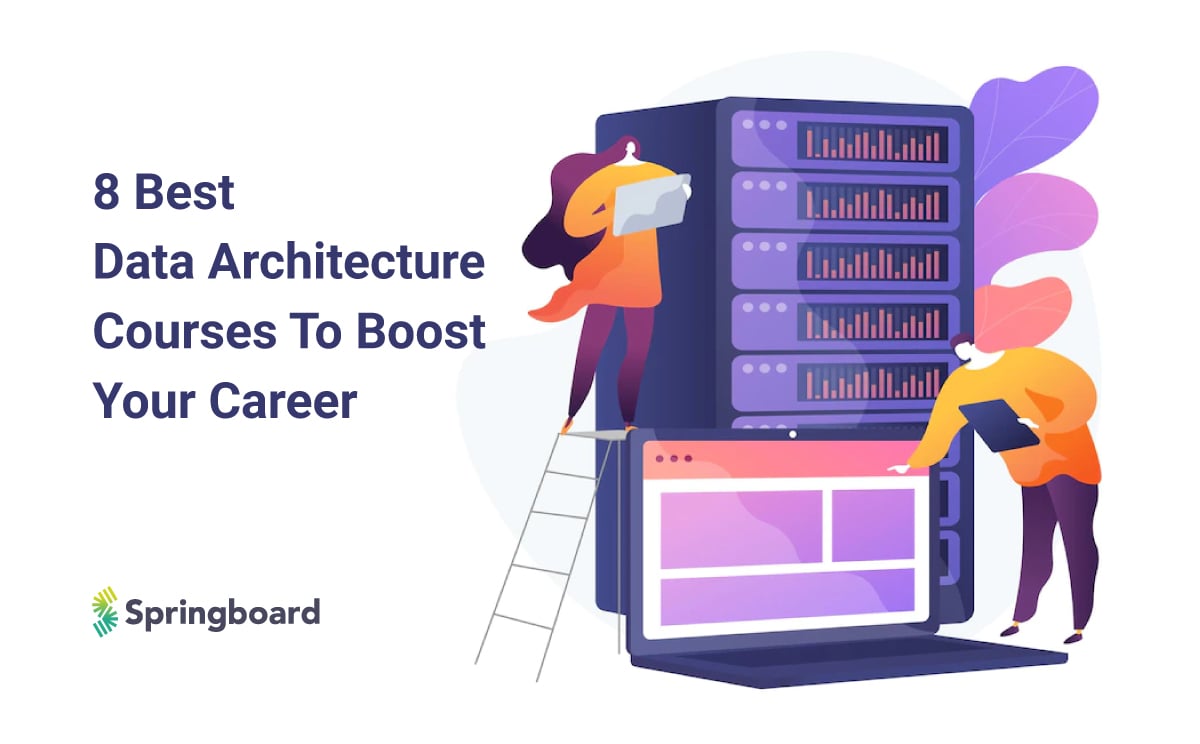




![What is Data Science [2022 Guide]](https://www.springboard.com/blog/wp-content/uploads/2016/11/what-is-data-science-2022-guide.png)

